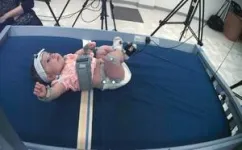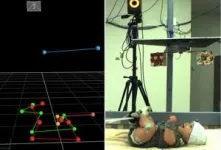(Press-News.org) Low socioeconomic status can negatively impact children’s health in preschool, along with their ability to follow specialized health education intervention programs, Mount Sinai researchers found in an international study focused on health promotion in schools, including those in the Harlem section of New York City. The results, published September 18 in the Journal of American College of Cardiology, stress the importance of introducing a specialized health curriculum in classrooms starting in preschool.
“This study shows that socioeconomic factors, including lower household income and education level, can negatively impact children’s health starting in preschool and emphasizes the importance of promoting healthy lifestyle habits through a specialized school curriculum focused on nutrition and exercise starting in preschool to prevent cardiovascular disease later in life. It is also important to not just educate children, but also teach their caretakers and teachers about healthy habits to further support these efforts,” says Valentin Fuster, MD, PhD, President of Mount Sinai Heart, Physician-in-Chief of The Mount Sinai Hospital, and General Director of the Spanish National Center for Cardiovascular Research (CNIC). Dr. Fuster created and led the trial, known as the FAMILIA Project at Mount Sinai Heart.
The study is part of an ambitious multinational effort to intervene early in the lives of children, their caretakers, and teachers so they can form a lifetime of heart-healthy habits. Researchers conducted the work in 15 Head Start Schools in Harlem, a socioeconomically disadvantaged area that is commonly linked to higher rates of obesity, heart disease, and other health issues. The work was also done in schools in Madrid, Spain (middle to high economic status), and Bogotá, Colombia (middle to low economic status).
Researchers analyzed a total of 3,839 children between three and five years old—562 students in Harlem, 1,216 in Bogotá, and 2,061 in Madrid. At the beginning, children had their weight and height measured and answered a simple guided questionnaire, which included pictures for easier comprehension, to test their knowledge, attitudes, and behaviors regarding diet, physical activity, how the human body and heart works, and emotions.
Children in half of the preschools (the control group) had their regular classroom curriculum, while children in the other preschools (the intervention group) went through a different learning program created by cardiologists, psychologists, and educators over a four-month period. In this program, students had specialized classwork, where teachers taught them about healthy diet, physical activity, how the human body works, and managing emotions. Caregivers were also told to engage in specific activities with their children on weekends during the four months, including buying fresh fruit at the grocery store and choosing physical activity over sedentary behavior. After four months, researchers reassessed children’s weight and height and gave that same questionnaire to children in both the control and intervention groups and compared them.
In this study, researchers specifically looked at household income and educational level, and how they impact students’ knowledge, attitudes, and habits (KAH) toward a healthy lifestyle, and their body mass index z-scores (zBMI). They assessed how socioeconomic status impacted children’s health before and after intervention.
The overall adjusted baseline KAH averaged at 46.3 points on a scale from 0 to 80. Children with higher socioeconomic status—as measured by both household income and educational level—started with higher (healthier) baseline scores. Students with high parental educational level had higher KAH scores (average of 47.2) than those with low parental educational level (average of 45.7). Children from high-income households had better KAH scores (47.4) than children from low-income households (45.8). Children from families with high educational level and household income had a lower zBMI compared with children from families with low educational level and household income at baseline.
After the end of the intervention, researchers compared KAH and zBMI between intervention and control groups. Overall, KAH improved more in the intervention group than in controls, and went up by 4.76 points compared to the control group after four months. There was also a bigger jump in points among children with higher socioeconomic status. KAH for the high-household-income intervention group went up by 6.33 more points than the control group. KAH for low-household-income intervention students went up 4.24 points more than the control group. KAH for intervention students from high-education families went up by 4.96 compared to the control group, and 3.75 for those from low-education families, suggesting that children from these families did not follow the curriculum as well as those from high-education backgrounds. zBMI numbers did not significantly change after the intervention and there were no major differences in zBMI between socioeconomic groups.
Dr. Fuster and his team are now running this school program in two boroughs of New York City and plan to expand it across the five boroughs in the next few years. This project will evaluate many other factors about health, teacher’s motivation, environment (pollution), and familial issues.
The FAMILIA project in the United States was funded by a grant from the American Heart Association and the Stephen Gellman Children’s Outreach Program The work in Spain and Colombia was funded by the SHE Foundation, the “la Caixa” Foundation. The project in Colombia was funded by the Santo Domingo Foundation.
Mount Sinai Heart is one of the nation’s top 4 hospitals in Cardiology/Heart Surgery
Mount Sinai Heart ranks No. 1 in New York and No. 4 globally according to Newsweek’s “The World’s Best Specialized Hospitals.” The Mount Sinai Hospital is also No. 1 in New York for cardiology, cardiac surgery, and vascular surgery, according to U.S. News & World Report®.
It is part of Mount Sinai Health System, which is New York City's largest academic medical system, encompassing eight hospitals, a leading medical school, and a vast network of ambulatory practices throughout the greater New York region. We advance medicine and health through unrivaled education and translational research and discovery to deliver care that is the safest, highest-quality, most accessible and equitable, and the best value of any health system in the nation. The Health System includes approximately 7,400 primary and specialty care physicians; 13 joint-venture outpatient surgery centers throughout the five boroughs of New York City, Westchester, Long Island, and Florida; and more than 30 affiliated community health centers. Hospitals within the System are consistently ranked by Newsweek’s® “The World’s Best Smart Hospitals” and by U.S. News & World Report's® “Best Hospitals” and “Best Children’s Hospitals.” The Mount Sinai Hospital is on the U.S. News & World Report's® “Best Hospitals” Honor Roll for 2023-2024.
For more information, visit https://www.mountsinai.org or find Mount Sinai on Facebook, Twitter and YouTube.
###
END
Preschoolers from low-income families may have worse health and benefit less from health promotion interventions than children with higher socioeconomic status
2023-09-18
ELSE PRESS RELEASES FROM THIS DATE:
Oregon State receives $7.5 million grant to build state of the art zebrafish biomedical research facility
2023-09-18
CORVALLIS, Ore. – Oregon State University has received a $7.5 million National Institutes of Health grant to modernize a lab focused on using zebrafish to address pressing human health challenges.
The Sinnhuber Aquatic Research Laboratory, led by Distinguished Professor Robyn Tanguay, a molecular toxicologist in the College of Agricultural Sciences, exploits the unique advantages of zebrafish to protect and improve human and environmental health. Zebrafish and humans have similar developmental processes and are similar on a genomic level, ...
Employee surveys may miss out on uncovering toxic leadership practices
2023-09-18
BINGHAMTON, N.Y. -- Standardized and overly simplistic questionnaires are only scratching the surface of what employees think of their leaders, according to new research from Binghamton University’s School of Management (SOM), and negative behavior may be slipping through the cracks.
As a result, the research finds, organizations may be missing out on critical information that could be keeping toxic leaders in positions of power.
“Instead of capturing actual leader behaviors, ratings might simply reflect whether a person likes their leader,” said Mengying ...
Key to solving Libyan conflict lies within the country, analysis says
2023-09-18
The key to solving the Libyan political conflict lies within the country rather than with the international community, analysis says.
Electoral and governance deadlock has been blamed for the devastating impact of the flooding in the country.
The “contentment” of the political elite and others with the status quo - given the currently limited levels of violence and the rising global prices of energy since the outbreak of Russia’s war on Ukraine - explains the general lack of a genuine commitment to relaunch the transition and electoral roadmap, ...
Personalized combination treatment turns on an immunometabolic switch to effectively control an aggressive form of prostate cancer
2023-09-18
Researchers at the University of Chicago Medicine Comprehensive Cancer Center established “proof-of-concept” for a new treatment approach that was able to effectively treat the most aggressive forms of prostate cancer. The treatment showed complete tumor control and long-lasting survival without side effects in a mouse model of advanced prostate cancer.
These findings, which were published online September 18, 2023, in Clinical Cancer Research, warrant further investigation in human clinical trials, the researchers concluded.
Strategies to overcome resistance
“Prostate cancer in the metastatic ...
Power meals: Child care-provided meals are associated with improved child and family health
2023-09-18
Philadelphia, September 18, 2023 – Very young children who attend child care and receive onsite meals and snacks were more likely to be food secure and in good health, and less likely to be admitted after a hospital emergency department visit than children in child care whose meals and snacks were provided from home, according to a new study in the Journal of the Academy of Nutrition and Dietetics, published by Elsevier. These potential benefits could extend beyond the children themselves to their families, including through possible reductions in stress, and to society as a whole through potentially significant healthcare cost savings.
Lead author Stephanie ...
DOE backs Rice study of how soils store carbon
2023-09-18
HOUSTON – (Sept. 18, 2023) – Two Rice University scientists have received a 3-year grant from the Department of Energy (DOE) to investigate a form of carbon storage that is as little understood as it is ubiquitous: soil.
Mark Torres, an assistant professor of Earth, environmental and planetary sciences, and Evan Ramos, a postdoctoral fellow in the Torres lab, will track how key minerals form in a watershed to build a fuller picture of the processes that allow soil to store carbon as organic matter.
“Soil on Earth contains three times more carbon than the atmosphere,” Ramos said. “We ...
University of Colorado Anschutz Medical Campus receives $54 million from NIH
2023-09-18
The National Institutes of Health has awarded $54 million over a seven-year period to the CCTSI at CU Anschutz. The grant from the National Center for Advancing Translational Sciences (NCATS) will fuel biomedical research and training across the state. This is the fourth consecutive time the NIH has funded the CCTSI since 2008 through its Clinical Translational Science Award (CTSA) program.
“This powerful grant will allow the University of Colorado to conduct leading-edge research that can directly impact health and patient care, reduce health disparities across our state and remain poised to respond to public ...
UNIST and Pusan National University Yangsan Hospital collaborate on advanced 3D printing medical device technology
2023-09-18
UNIST, in collaboration with Pusan National University Yangsan Hospital, has embarked on an exciting joint venture to research and develop advanced 3D printing medical device technology.
The UNIST 3D Printing Convergence Technology Center recently signed a business agreement with the Medical Device Usability Test Center at Pusan National University Yangsan Hospital. This agreement outlines their collaborative efforts in various areas, including the research and development of 3D printing-based medical devices as well as support for the commercialization of domestically developed devices.
Notably, Yangsan Pusan National University ...
The missing link to make easy protein sequencing possible?
2023-09-18
There has been a real race among scientists to create a technology that enables easy protein sequencing. Professor of Chemical Biology Giovanni Maglia of the University of Groningen has now found the missing piece in the puzzle: a way to transport a protein through a nanopore, which allows sequencing of proteins in a simple, handheld device.
DNA sequencing has been a revolution in how we understand life, and sequencing proteins is the next holy grail. Maglia explains: ‘DNA is mostly static. The processes in our cells are executed by proteins: they do the actual work. ...
Ochsner Health to integrate generative AI into patient messaging
2023-09-18
This month, Ochsner Health is launching a pilot program that uses AI to draft simple messages to patients in the MyOchsner app portal. A small group of Ochsner clinicians will participate in testing a new Epic feature that drafts responses to routine patient requests, which will then be reviewed and edited by the clinicians. The feature is meant to speed up app response time to patients and allows doctors to spend more time with patients.
“Ochsner has long been a leader in using digital tools to improve the patient experience,” said Ochsner ...








